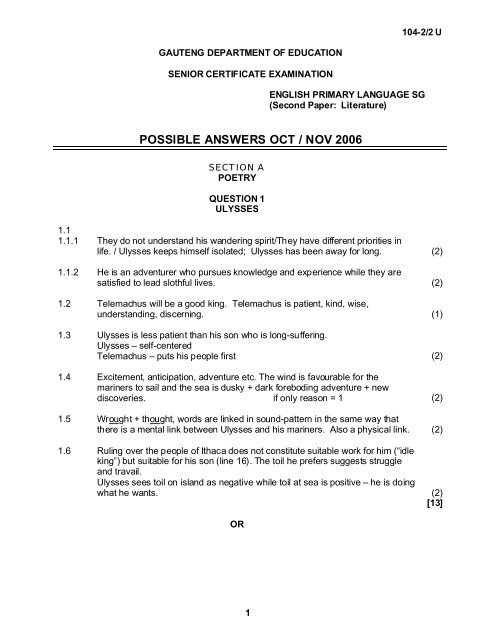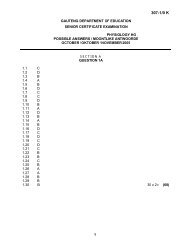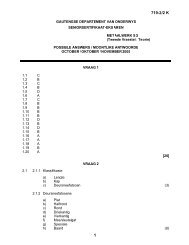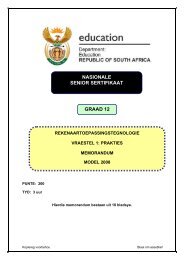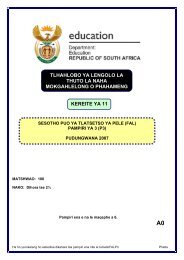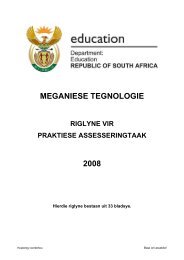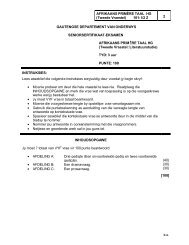View Paper - Gauteng Shared Service Centre
View Paper - Gauteng Shared Service Centre
View Paper - Gauteng Shared Service Centre
You also want an ePaper? Increase the reach of your titles
YUMPU automatically turns print PDFs into web optimized ePapers that Google loves.
104-2/2 U<br />
GAUTENG DEPARTMENT OF EDUCATION<br />
SENIOR CERTIFICATE EXAMINATION<br />
ENGLISH PRIMARY LANGUAGE SG<br />
(Second <strong>Paper</strong>: Literature)<br />
POSSIBLE ANSWERS OCT / NOV 2006<br />
SECTION A<br />
POETRY<br />
QUESTION 1<br />
ULYSSES<br />
1.1<br />
1.1.1 They do not understand his wandering spirit/They have different priorities in<br />
life. / Ulysses keeps himself isolated; Ulysses has been away for long. (2)<br />
1.1.2 He is an adventurer who pursues knowledge and experience while they are<br />
satisfied to lead slothful lives. (2)<br />
1.2 Telemachus will be a good king. Telemachus is patient, kind, wise,<br />
understanding, discerning. (1)<br />
1.3 Ulysses is less patient than his son who is long-suffering.<br />
Ulysses – self-centered<br />
Telemachus – puts his people first (2)<br />
1.4 Excitement, anticipation, adventure etc. The wind is favourable for the<br />
mariners to sail and the sea is dusky + dark foreboding adventure + new<br />
discoveries. if only reason = 1 (2)<br />
1.5 Wrought + thought, words are linked in sound-pattern in the same way that<br />
there is a mental link between Ulysses and his mariners. Also a physical link. (2)<br />
1.6 Ruling over the people of Ithaca does not constitute suitable work for him (“idle<br />
king”) but suitable for his son (line 16). The toil he prefers suggests struggle<br />
and travail.<br />
Ulysses sees toil on island as negative while toil at sea is positive – he is doing<br />
what he wants. (2)<br />
[13]<br />
OR<br />
1
104-2/2 U<br />
QUESTION 2<br />
ANTHEM FOR DOOMED YOUTH<br />
2.1 An anthem is a song of praise, it is a solemn hymn. Candidates may regard it<br />
as appropriate because it is a requiem to the deceased.<br />
anthem – song sung by a choir – links to “choir of walling shells”<br />
If only ‘song of praise’<br />
anthem – praise but poet is not praising men’s deaths / tone of bitterness not<br />
praise<br />
OR<br />
They may feel it is inappropriate because it is used ironically. The poet focuses<br />
on the brutality of war and not on lauding the heroic deaths of the young men.<br />
Do not award any marks for “Yes” or “No”. Award marks for logical reasoning.<br />
Candidates must show that they know what an anthem is. (2)<br />
2.2 Dramatic impact. Reader becomes intimately involved as though the question<br />
is put to him and he has to consider the issue of soldiers being slaughtered like<br />
cattle to answer the question.<br />
Draws attention and makes reader interested / highlights the tragedy of their<br />
deaths / personalises poem. (2)<br />
2.3 THOSE suggests distance; THESE accentuates horror because it denotes<br />
personal / immediate loss.<br />
“Those” – less impact / men not named – impersonality of their deaths – like<br />
cattle<br />
Tense – “those” – past tense<br />
“these” – killing ongoing (2)<br />
2.4 Men are compared to cattle being slaughtered<br />
OR<br />
Youths are not named but are “them” or “those”.<br />
No proper funeral, but a suggestion of abrupt annihilation. (2)<br />
2.5 The volley of gunshots / noise of guns and rifles. (2)<br />
2.6 Undertone of insanity / lunacy that links with Owen’s theme that war is<br />
madness. (2)<br />
2.7 Pallor – 1 word or 0 (1)<br />
[13]<br />
AND<br />
QUESTION 3<br />
MENDING WALL<br />
2
104-2/2 U<br />
3.1 Not how speaker feels about Neighbour<br />
Condescending / friendly but superior (or similar) – a relevant implied negative<br />
attitude. (2)<br />
3.2 Stresses issues speaker regards as Important, viz that “something” in life does<br />
not approve of a wall + the neighbour repeatedly uses the same cliché. /<br />
stresses Neighbour’s argument / highlights Neighbour’s lack of insight . (2)<br />
3.3 Stating that his apple trees will not eat his neighbour's pine trees<br />
Referring to elves breaking down the wall / compares stones to loaves / idea of<br />
a spell to make stones stay in place. (2)<br />
3.4<br />
3.4.1 Wistful / wishful / contemptuous / mocking / tongue-in cheek / irritated /<br />
sarcastic / frustration. (1)<br />
3.4.2 Conviction / determined / assured / confident / emphatic / proud. (1)<br />
3.5<br />
3.5.1 Identification + explanation of what a simile or metaphor is /<br />
Metaphor: comparing shapes of boulders to loaves of bread and balls. (2)<br />
3.5.2 Simile: Neighbour looks like primitive man armed with two huge stones,<br />
walking as though on the attack.<br />
Alliteration: harsh sounds highlight idea of savagery. (2)<br />
[12]<br />
QUESTION 4<br />
DEATH, BE NOT PROUD<br />
4.1 Death as a person – speaker more confident in demeaning it.<br />
Death as a person – can listen to the argument – humanises it therefore less<br />
fearful.<br />
It immediately diminishes the fear that is usually associated with death. One<br />
can come to terms with another person far easier than one can with an<br />
abstraction (like death). By making death a weak, despicable and pretentious<br />
person, Donne can express his contempt for it more easily. / Show death not<br />
immortal and can die. (3)<br />
4.2 His faith is secure and supremely confident / unbreakable / Christian (2)<br />
4.3 Death is usually associated with the end (stop, cessation) of life, whereas flow<br />
suggests a continuance - the opposite to something ending.<br />
‘overthrow’ – violent<br />
‘flow’ – calm (2)<br />
4.4 That they have the utmost authority even to the point of having people<br />
executed. (2)<br />
4.5 Eternal life / not ‘rest’ (1)<br />
3
104-2/2 U<br />
4.6 Desperate men commit suicide / murder / death must wait for desperate men<br />
to deliver the victims. (2)<br />
[12]<br />
SECTION B<br />
SHAKESPEARE<br />
MACBETH – William Shakespeare<br />
QUESTION 5<br />
ESSAY<br />
TOTAL FOR SECTION A: [25]<br />
Having read Macbeth’s letter, Lady Macbeth is determined that her husband shall be<br />
king. Encouraged by the fact that the king is coming to spend the night in their home she<br />
starts planning for Duncan’s death.<br />
She is responsible only for the death of Duncan because Macbeth tells her while<br />
they are still at dinner that he has changed his mind. / He is not prepared to go through<br />
with the murder. / He does not tell her the real reasons he has for not wanting to murder<br />
Duncan. / He talks about ‘golden opinions’ and wanting to enjoy them in their ‘newest<br />
gloss’ / He wants to enjoy his titles.<br />
He does not tell her about the witches’ prophecy for Banquo / i.e. his children would be<br />
kings though he would not be one himself.<br />
She does not see his reasons as being good enough to go back on his word /– she is<br />
angry that he appears to be cowardly, / one who cannot keep his word, one who cannot<br />
seize the opportunities offered. / She is scornful./<br />
He fears her scorn./<br />
Encouraged by her confidence he decides to go ahead. / She does not force him but<br />
she does make it difficult for him to refuse to do as she suggests/ – he allows himself to<br />
be manipulated./ She is a good talker; / she has everything planned; /she makes<br />
everything sound so easy / and so she fools him into doing as she says. Earlier on she<br />
admits he has not the courage to see things through if there should be something slightly<br />
wrong./ She deliberately persuades him to do as she says./<br />
Once Macbeth is king he seems to withdraw from her. / He keeps to himself. He no<br />
longer consults her. / ‘Be innocent of the knowledge…’<br />
She knows nothing of Banquo’s death until after the deed/. She may suspect he is up to<br />
something but she has no proof. //Yet she could have done something to prevent him<br />
from carrying out the murder if she wanted to./<br />
Macduff’s family’s murder shocks her./ She may have sent the messenger to warn<br />
Lady Macduff. By the time she speaks of this murder she is sleepwalking./<br />
OR<br />
4
104-2/2 U<br />
QUESTION 6<br />
CONTEXTUAL<br />
6.1 Cawdor (1)<br />
6.2 He has trusted Cawdor completely and Cawdor has betrayed him by<br />
joining forces with Sweno. He had no idea what Cawdor had been up to.<br />
Did not expect it of him. (3)<br />
6.3 Macbeth will betray Duncan more than the late Cawdor did. He will<br />
murder the king while Duncan is a guest in his home. 3 valid points. (3)<br />
6.4 He says all the right things and shows he is fully aware of his responsibilities to<br />
his king who represents the nation./ Says he enjoys doing his duty for the sake<br />
of loyalty to King / country. (2)<br />
6.5 (Unexpected.) He had been expecting to be the Prince of Cumberland.<br />
Duncan had promised him that more promotion was in the offing. / Malcolm is<br />
now an obstacle.<br />
Ref. to witches prediction of his initial thoughts of murdering Duncan and<br />
subseq decision to allow fate to take its course. 3 points req. (3)<br />
6.6 An aside means that all the other characters are on stage but they can’t hear<br />
him although they can see him and his reactions./ This speech makes him<br />
appear more wicked (evil) because while everyone (others present) is smiling<br />
on him we know what he is planning. (2)<br />
6.7 He is everything they are not – he is a murderer, a usurper (2)<br />
6.8 Every time Macbeth wants to sit he finds that Banquo’s ghost is there. / It is as<br />
if to remind us and Macbeth that Banquo’s descendants will be the legitimate<br />
heirs and he Macbeth has no business trying to sit there. / It makes the scene<br />
more dramatic – adds to Macbeth’s confusion. (3)<br />
6.9 His reactions to the ghost’s presence are going to arouse the suspicions of his<br />
thanes who are soon going to want to get rid of him. It is also the thin edge of<br />
the wedge that will bring about the end of Macbeth’s reign as King of Scotland. (3)<br />
6.10 She is trying to get him to pull himself together by accusing him of being a<br />
coward. She does not want the other characters to hear her. (2)<br />
6.11 Macduff accept Malcolm / Donaldtain. (1)<br />
[25]<br />
OR<br />
5
104-2/2 U<br />
JULIUS CAESAR – William Shakespeare<br />
QUESTION 7<br />
ESSAY<br />
Cassius is the leader of the conspirators and he initiates the conspiracy against Caesar<br />
both for political and personal reasons.<br />
Cassius – less noble<br />
Like Brutus and other senators he does not want Rome to be ruled by one man. But<br />
unlike Brutus his motives for planning the assassination of Caesar is his envy, jealousy<br />
and his sense of inferiority. He is envious of Caesar’s quick rise to power which<br />
gives Caesar total control and a superior/arrogant attitude. When he decides on the<br />
conspiracy he is shrewd enough to realise that without Brutus, he will be unable to<br />
carry this out - he requires Brutus’ honour which he is well known and respected for.<br />
Cassius also recognises Brutus’ gullibility – he is easily manipulated, easily flattered and<br />
has a great sense of patriotism towards the ruler, but mostly to the Roman people. In<br />
trying to win Brutus over to his side and way of thinking, Cassius is very cautious in<br />
developing his argument, trying not to raise Brutus’ suspicion of his true motives.<br />
He disparagingly recalls Caesar’s weaknesses – his challenge to Cassius to swim<br />
the Tiber and then almost drowning till he is rescued by Cassius, epileptic fits he has, his<br />
childlike behaviour when he has a fever – all these examples are meant to make Caesar<br />
look insignificant and weak. Knowing Brutus’ loyalty to the Romans, Cassius<br />
impresses on him the danger that Caesar poses to Rome “upon what meat doth this our<br />
Caesar feed, that he is grown so great.” In this way he insidiously works on Brutus’<br />
conscience and fear of Rome losing its Republican status.<br />
Cassius having better judgement:<br />
Cassius works on other conspirators specially selected on the basis of their<br />
personal differences with Caesar, e.g. Metellus Cimber, whose brother was banished<br />
from Rome by Caesar. On the night/morning of their meeting with Brutus in his garden,<br />
suggestions made by Cassius are rejected by Brutus – directly leading to the failure<br />
of the conspiracy after Caesar’s assassination e.g. Brutus’ refusal to take an oath, his<br />
total rejection of the idea that Antony too must be assassinated or that he will prove<br />
dangerous to their safety. Cassius’ shrewd nature recognises the qualities of Antony –<br />
that far from being a playful, fun-loving, frivolous person, should he choose to, Antony<br />
can be extremely dangerous to their plot – “we shall find of him a shrewd contriver”, “his<br />
means, if he improve them, may well stretch so far as to annoy us all”, “yet I fear him, for<br />
in the ingrafted love he bears to Caesar.’ Later in the play, we see the truth of<br />
Cassius’ words unfolding when Brutus impulsively and naively permits Antony to<br />
speak at Caesar’s funeral – Antony is able to manipulate the mob and incites a mutiny<br />
against the conspirators forcing them to flee Rome. Here too Cassius begs Brutus not<br />
to allow Antony the podium but again Brutus is unable to sense the danger Antony<br />
poses. Cassius also recognises that he is disliked by Caesar – he is the only one of<br />
the conspirators who does not go to Caesar’s house to fetch him the day Caesar was<br />
assassinated.<br />
6
104-2/2 U<br />
When the two armies have to face each other, Cassius advises that their armies<br />
remain in Sardis – their men will be fresh and not tired, they will wait for the enemy to<br />
come to them thus having the element of surprise. Brutus insists they march on to<br />
Phillipi. Although Cassius knows that this is a costly error of judgement, he relents<br />
as he has just come out of a terrible argument with Brutus and does not wish to risk his<br />
friendship. He is also at his lowest point – not the strong, confident Cassius we know<br />
him to be. During the parley with Octavius Caesar and Antony, Cassius reminds<br />
Brutus that they would not have had to face Antony’s acid tongue if Cassius’ advice<br />
had been taken.<br />
Thus it is clear that whilst Brutus is nobler, the conspiracy would have been successful<br />
only if Brutus accepted the more perceptive and wiser decisions of Cassius.<br />
Use grid – Content: 20; Style: 5<br />
[25]<br />
OR<br />
QUESTION 8<br />
CONTEXTUAL<br />
8.1<br />
8.1.1 The peasants / plebeians are insensitive fools / unfeeling idiots / unthinking<br />
lumps / like stones. (Any 1 description) (2)<br />
8.1.2 Yes – later in the play we see how they are manipulated/incited into<br />
mutiny against conspirators (OR)<br />
how they are easily deceived by Caesar into believing that he does not<br />
want the crown (OR)<br />
how they turned their loyalties so quickly from Pompey to Caesar/ Brutus<br />
to Antony.<br />
2x1½=(3)<br />
8.1.3 insulting / contemptuous/angry / argumentative or similar (1)<br />
8.1.4 Marullus is angry with the common people as they have abandoned their<br />
daily jobs/occupations in favour of celebrating the victory of Caesar over<br />
Pompey’s sons. . The punctuation (commas and exclamation mark)<br />
indicates his anger. Strong emotive language (negative) (3)<br />
8.2 Pompey is also a Roman General and a leader. (2)<br />
8.3 He plans to chase other commoners from the streets who are also celebrating<br />
Caesar’s victory and to remove all decorations and ornaments adorning<br />
statues in honour of Caesar. (2)<br />
8.4 During the feast of Lupercal, the soothsayer warns Caesar thrice to be careful<br />
of the Ides of March. (2)<br />
8.5 Caesar’s arrogance, his absolute confidence that nothing can harm him, the<br />
fact that the soothsayer is a low person in terms of status. He wants to prove<br />
to the soothsayer that he is still alive and safe on the Ides of March. (2)<br />
7
104-2/2 U<br />
8.6 Caesar would be at the centre of the stage surrounded by all the senators /<br />
conspirators. Artemidorus would be directly in front of Caesar and Decius to<br />
Caesar’s right trying to wedge in between the two – to prevent Caesar from<br />
reading the letter as it can possibly implicate the conspirators and reveal their<br />
plans to assassinate Caesar. (3)<br />
8.7<br />
8.7.1 That which concerns Caesar would be attended to last. (1)<br />
8.7.2 He considers himself to be very powerful/uses the royal plural “we”/ indicates<br />
his arrogance/superiority/pride. (Any 2 answers) (2)<br />
8.8 No – Cassius is jealous of Caesar – the others including Cassius have planned<br />
Caesar’s assassination after they arrive at the Capitol. Their plan succeeds<br />
and Caesar is killed. (2)<br />
[25]<br />
SECTION C<br />
NOVEL<br />
QUESTION 9<br />
A TALE OF TWO CITIES – Charles Dickens<br />
ESSAY<br />
Both Mr Cruncher and Miss Pross help the family escape from France./<br />
TOTAL FOR SECTION B: [25]<br />
Both are eccentric and comic characters who seem to provide the only real humour in<br />
the novel./ It is through them that the plot reaches its climax./<br />
Jerry who sets himself up as an ‘ honest tradesman’ is a grave robber at night and a<br />
porter at the bank by day. /His appearance /– the spiky hair and close set eyes – and<br />
his belligerent manner /make him a perfect bodyguard to accompany Mr Lorry to France<br />
where his assistance is greatly needed. It is he who recognises Barsad for what he is /<br />
and it is he whose knowledge of Cly’s supposed funeral /forces Barsad to help Sydney<br />
Carton rescue Darnay./<br />
His use of euphemisms/ in connection with his trade and his great horror of his wife’s<br />
prayers /add to the grim humour of the novel.His extreme interest in all funerals adds to<br />
the sense of mystery in the novel./<br />
8
Miss Pross on the other hand is a big red woman /– a spinster who has had the care of<br />
Lucie for many years./ She guards Lucie jealously and does not like anyone to steal her<br />
affections away from her./ Although a bad judge of character where her brother is<br />
concerned she is prepared to sacrifice her life to ensure Lucie’s happiness./ Her<br />
recognising Barsad as her brother /and Mr Cruncher recognising him as someone from<br />
the Old Bailey/ help Sydney to persuade Barsad to accompany him and Jerry to Mr<br />
Lorry’s rooms/ where Carton can work on him to help him save Darnay for Lucie./ It is<br />
Miss Pross who prevents Madame Defarge from discovering whether Lucie is behind the<br />
door or not. /In the ensuing struggle Madame Defarge dies/ and Miss Pross becomes<br />
deaf. Her locking the door and throwing away the key though amusing helps buy all of<br />
them a little more time./<br />
104-2/2 U<br />
Jerry like Dr Manette has two lives / is a parody of the good doctor. Miss Pross on the<br />
other hand is the very opposite of Madame Defarge/ who hates the Manette/Darnay<br />
family as intensely as Miss Pross loves them./ When Jerry and Miss Pross are on their<br />
way out of Paris their conversation makes the reader smile for neither knows what the<br />
other is talking about but neither wants to admit it or show it.<br />
[25]<br />
OR<br />
QUESTION 10<br />
TALE OF TWO CITIES<br />
CONTEXTUAL<br />
10.1 A method of keeping track /of who among the aristocracy must be punished./<br />
Madame Defarge keeps the records in the patterns she knits (3)<br />
10.2 She has the most reason for revenge. / She is the youngest child of the family<br />
that had been wiped out by the Evremonde family whose lusts were/are<br />
insatiable. / (2)<br />
10.3 She is absolutely unmoving and implacable. / No-one will escape their revenge<br />
once she has them listed. (2)<br />
10.4 To report Gaspard’s death to the group/ A trip to the metropolis might also be a<br />
way of rewarding him and ensuring that he will continue with his activities./ (2)<br />
10.5 Caricatures him as the man with the craving. / He is always gnawing and<br />
hungry. / or Dickens focuses on an aspect / and describes that aspect in many<br />
ways using different words which emphasise that aspect./ (2)<br />
10.6 To ensure he will want revenge / when he sees the luxurious coaches and<br />
exquisite clothes compared to his poverty./ (2)<br />
10.7 The false / fake funeral of Roger Cly in England/ (2)<br />
10.8 He knows that no mercy will be shown him especially by Madam Defarge /<br />
who had registered him when he had arrived to spy for the French<br />
Government. / He is a coward (3)<br />
9
104-2/2 U<br />
10.9 To see if he can do anything to help Darnay so that Lucie will have her<br />
husband restored to her and she will be happy/ He loves Lucie and will do<br />
anything to ensure her happiness / (2)<br />
10.10 To arrange for him to visit Darnay / so that he can exchange places and so<br />
allow Darnay/ to leave the prison and join his wife and child (3)<br />
10.11 Has witnesses present until Barsad admits what his game is. / Once Sydney<br />
has that established then he seeks a private word with him. / (2)<br />
[25]<br />
JULY’S PEOPLE – Nadine Gordimer<br />
QUESTION 11<br />
ESSAY<br />
In the opening pages of the novel, Maureen is confident in her power and ability to<br />
continue her parental role in the village as she has in the city.<br />
Maureen knows little about July’s world, his thoughts, and his relationship to his wife<br />
and the woman with whom he lived, his society at home. After coming to the village she<br />
attempts to become part of the village community and to claim a special relationship<br />
with July. This is rebuffed and she remains an outsider.<br />
Her role as a mother<br />
When July suggests that they go to his house, Maureen’s concern is for her family –<br />
taking oranges, the radio, toilet paper, stealing malaria tablets from the pharmacy, she<br />
worries about the children falling ill from drinking water from the river, she is repulsed<br />
by the thought that they are defecating anywhere and are using stones instead of paper,<br />
she admonishes Victor for kicking at July’s zinc bath warning him to respect July’s<br />
property. Even at the end of the novel, we see Maureen repairing the tear on the boys’<br />
pants and when she runs towards the helicopter, she lovingly folds the half-stitched<br />
pants, places them on the bed and caresses them. She abandons the children in the<br />
confidence that they will be well-cared for by July and have blended into the African<br />
household.<br />
10
104-2/2 U<br />
Her role as a wife<br />
Dutiful, loving wife in the city. In the village, in her relationship with her husband we<br />
see how she slowly starts losing respect for him as their condition in the village<br />
changes and their possessions are gradually taken away from them. Maureen and Bam<br />
are no longer talking to each other. July’s appropriating the bakkie is the beginning of<br />
the antagonism between Maureen and Bam and culminates when the gun is stolen by<br />
Daniel. Whilst Bam is accepted by the Black males, invited to drink with them, Maureen<br />
remains an outsider, not welcome to join the ladies when they go to pick spinach, wash<br />
clothes or pick grass. In a way she forces her company on to them. She tries to read a<br />
novel whilst Bam helps erect a water tank. She is trapped and disorientated by day - the<br />
novel provides no escape. Bam appears to be satisfied with his life for the time being –<br />
he and he children adjust to their new life and Maureen seems determined not to be<br />
absorbed into this society. Bam and Maureen drift apart. In fact, she does not need<br />
Bam. The other area of conflict between Maureen and Bam is the decision as to<br />
whether or not they should have gone to Canada, and then to the coast, thereby<br />
escaping political upheaval in South Africa. She feels he is manipulated by July into<br />
coming to the village. Maureen feels he is to blame for their recent predicament.<br />
Her role as an employer<br />
Maureen considers herself to be the perfect employer. July has worked for her for 15<br />
years. She has always sent gifts for his family on his bi-annual trip home. In her two<br />
confrontations with July, she is forced to admit that her knowledge of July is inadequate.<br />
He vents his resentment on her. She is shown to be a distrustful employer when he<br />
accuses her of following him around the house to make certain his work is done<br />
properly. When they go on holiday, she gives him extra work to keep him occupied. He<br />
feels that he was treated harshly and unreasonably and he dumps his anger on her<br />
by his repeated use of the word “boy”. After the second confrontation with July over the<br />
stolen gun, she does not hesitate to be open in her insults to July as he is with her.<br />
She has nothing to lose. She is fighting for her own survival. The children and Bam<br />
have found a new life – she runs towards hers.<br />
By the end of the novel, her desire to be rid of her children is clear; she runs “like a<br />
solitary animal at the season when animals neither seek a mate nor take care of the<br />
young.”<br />
[25]<br />
OR<br />
QUESTION 12<br />
CONTEXTUAL<br />
12.1 There is civil unrest and a revolution in the city. The lives of white people are<br />
in danger. July suggests to the Smales that they can go `to the village as<br />
they have nowhere else to go. (3)<br />
12.2 July always told them on many occasions about the white man’s lifestyle – the<br />
number of rooms they had, the hot water so easily obtained. Now she finds it<br />
difficult to understand how they could be displaced. (Mark globally) (3)<br />
11
104-2/2 U<br />
12.3 Bitter/angry. + 1 reason July has taken from her a bed, a primus stove<br />
and her lovely pink cups to give to the Smales / July also takes his mother’s<br />
hut away from her for the Smales’ use/and she now has to share with Martha<br />
who is expected to make a sacrifice for the whites. (3)<br />
12.4 He is concerned for their welfare/feels sorry for them +and that is why he<br />
suggests his village as a refuge/He still considers that he is the servant/the<br />
way he brings the tea, lights the fire, warms water/ concern is for the comfort of<br />
the family. (2 reasons x 1) (3)<br />
12.5 The gun has disappeared and Maureen comes to confront July about its<br />
disappearance. (2)<br />
12.6 The gun is the only possession the Smales have after July takes the bakkie.<br />
It’s important as it’s a means of Bam ensuring his family’s safety. (2)<br />
12.7 The Smales children drag the parents to watch the setting up of the gumbagumba.<br />
Most of the villagers too are present. It is at this time that the gun is<br />
stolen. (2)<br />
12.8 When the riots start and people dash for safety, Maureen loots the<br />
pharmacy for malaria tablets. She has done precisely what she’s accusing<br />
July of doing – stealing. (3)<br />
12.9 His relationship with Maureen deteriorates. During their arguments, they vent<br />
their anger and insult each other with July showing Maureen his resentment of<br />
her treatment of him over the years. With the children, he has a very good<br />
relationship – they turn to him more than to Bam. With Bam there is no<br />
relation. Bam has surrendered in defeat and cannot fight for ownership of<br />
bakkie/gun. (Mark globally. candidates answer should focus on all members<br />
of the family. (4)<br />
[25]<br />
OR<br />
12
104-2/2 U<br />
MARU<br />
QUESTION 13<br />
ESSAY<br />
How Margaret Cadmore snr succeeded in her “experiment” and how Margaret jnr indeed<br />
helps her people.<br />
• Margaret junior’s academic achievements and decorum prove the success of the<br />
“experiment”: “environment everything, heredity nothing”<br />
Learners must elaborate on the experiment.<br />
How does she actually help her people?<br />
•<br />
•<br />
•<br />
•<br />
•<br />
•<br />
•<br />
Indirectly<br />
Maru had dreams and visions where “all humanity could evolve”(p.106) Maru “set<br />
the tone, seemingly, for a new world”(p.45) Maru says: “If I have a place it is to pull<br />
down the old structures and create the new” (p.62)<br />
Margaret herself has no direct contact with Masarwa in Dilepe.<br />
She helps her people through her exemplary conduct; She acts with dignity which<br />
elicits respect p.46: “The next day people noticed that the new mistress had dignity<br />
and respect for everyone” – i.e. slowly prejudice against Masarwa begins to<br />
crumble.<br />
People in Dilepe sensed the need for tolerance: “Prejudice is like the old skin of a<br />
snake. It has to be removed bit by bit” (p.48)<br />
“She was the teacher of their children and deserved some respect”<br />
Through her conduct she wins the affection and love of prominent people in the<br />
village.<br />
Ranko – besotted, carries her parcels<br />
Dikeledi – close friend, publicly condemns racism in school<br />
Moleka – pg 71: In awe of Margaret the night he wanted to visit her. He<br />
entertains his Masarwa slaves and sets the tone for social reform<br />
Maru – most prominent person in Dilepe, marries her. This elevates her to<br />
top hierarchy in their society which in turn gives the Masarwa tribe<br />
eminence.<br />
[25]<br />
OR<br />
13
104-2/2 U<br />
QUESTION 14<br />
CONTEXTUAL<br />
14.1 He instructed Moleka to collect and return the bed that had been lent to<br />
Margaret. (2)<br />
14.2 She is flabbergasted / shocked and gives a hysterical laugh (1)<br />
14.3 He does not want to conform to the demands placed on him by society / He<br />
wishes to marry a woman unacceptable to others / through his marriage he<br />
hopes to create a new social order and break down barriers of racial prejudice (3)<br />
14.4 Aware of social prejudice, places Maru on a pedestal, concerned about her<br />
friend’s happiness. (2)<br />
14.5 Enraged, furious, wants revenge, provoked, wrathful (2)<br />
14.6 Sarcastic / sardonic / malicious / mocking (1)<br />
14.7 She is in love with him but has been subjected to his wrath (2)<br />
14.8 He told her how Moleka had entertained the slaves and how he had treated<br />
them as his equals. (2)<br />
14.9 She has a romantic love / physical attraction for Moleka. She is aware of his<br />
relationships with other women, yet pursues her own sentimental dream. She<br />
has the utmost respect for Maru, admires him for his formidable disposition in<br />
their society. They have a close relationship, “their bloodstreams were one”. (4)<br />
14.10 He is often reckless / callous / heartless / insensitive and treats people<br />
disdainfully, e.g. Illegitimate children / driving recklessly / the way he imposes<br />
on Dikeledi to spite Maru, etc. (3)<br />
14.11 Moleka’s mother disclosed that she was terrorized into forcing the issue<br />
because Dikeledi was pregnant and Maru was irate about the abuse of his<br />
sister. Cold, calculated undertone. (2)<br />
14.12 He does not trust Maru / he fears he may go off to the old library where<br />
Margaret lives. (1)<br />
OR [25]<br />
14
104-2/2 U<br />
QUESTION 15<br />
ESSAY<br />
Candidates must agree with the criticism of indifference by Orwell. They may only<br />
refer to the minor characters in the novel.<br />
Agree<br />
NINETEEN EIGHTY-FOUR – George Orwell<br />
Mrs Parsons – colourless, wispy thirty-year-old, unkempt home, ill-disciplined children of<br />
whom she is afraid, spineless mother – does nothing to try and improve her situation<br />
Parsons – listens to Two Minutes Hate Speech with rapt attention, believes what he is<br />
told, is compared to an animal, proud of his children when they betray him and others<br />
(The children burn a woman’s skirt when she wraps sausages in a poster of BB,<br />
someone is betrayed for wearing different shoes)<br />
Syme – also described as an animal, doesn’t question the Party’s motives for changing<br />
words to Newspeak, in fact is proud of his job, knows what he is doing, described as<br />
“orthodox”, talks with “gloating satisfaction” about raids, trials, confessions and hangings<br />
Katherine (Winston’s wife) – blindly accepts and follows Party policy on sex in a marital<br />
relationship ie. For procreation, breeding children who will also follow principles of<br />
Ingsoc, no warmth or love<br />
Proles in general – only concern is day-to-day living, hand-to-mouth existence, pub<br />
owner can’t remember the past, woman who sings does so mindlessly<br />
If a candidate also disagrees with the statement:<br />
Jones, Aaronson and Rutherford – afraid of torture, they confess to “crimes” they most<br />
likely did not commit, difficult to rise up against brutal torture, like the other prisoners in<br />
the cell before they are taken to Room 101<br />
[25]<br />
OR<br />
15
104-2/2 U<br />
QUESTION 16<br />
CONTEXTUAL<br />
Extract A<br />
16.1 It promises abundant and increased supplies and yet it constantly reduces<br />
rations. (Candidates must show a clear understanding of irony) (2)<br />
16.2 Open mouthed, listening closely, in awe (Must use own words, so not “bored”) (2)<br />
16.3 So that the tobacco doesn’t fall out. (1)<br />
16.4<br />
16.4.1 Metaphor. (1)<br />
16.4.2 Outer Party members accept indoctrination without question. Reader can<br />
clearly understand that Parsons does not think for himself OR Parsons lacks<br />
the intelligence to question OR Parsons is gullible (2)<br />
16.5 He refers to “the past” suggesting that it has been changed. (2)<br />
16.6 Candidates must show clear understanding that simply thinking rebellious<br />
thoughts against the Party is a crime. It is not necessary to physically commit<br />
the crime. One good example of Winston’s thoughtcrime is required. (3)<br />
`Extract B<br />
16.7 It is an imaginary organisation created by the Inner Party in which the Outer<br />
Party members might show an interest, thereby indicating their tendency to<br />
rebel. This would then help the Inner Party to identify dissidents. (3)<br />
16.8 Winston would have seen the regular propaganda films of the Brotherhood<br />
during the ‘Two Minutes Hate’ and the ‘Hate Week’. As a worker in the<br />
Ministry of Truth, he has had glimpses of the eradication of the real facts and<br />
created his own opinions. (2)<br />
16.9 He wants them to betray themselves. He also wants to give them the book<br />
which outlines the principles of the Brotherhood so that they (particularly<br />
Winston) will provide conclusive proof of their rebellion. (2)<br />
16.10 O’Brien is able to switch off his telescreen. He has a luxurious apartment. He<br />
has a domestic worker. (Any two) (2)<br />
16.11 He works for the Ministry of Truth, which is concerned with getting rid of history<br />
that doesn’t suit the Party. Winston knows this and knows it’s wrong. (3)<br />
[25]<br />
TOTAL FOR SECTION C: [25]<br />
TOTAL: 75<br />
16


